Viva democracy and equality!
March 8, 2018, is exactly 118 years since the Women’s Conference in Denmark which set March 8 as International Women’s Day (IWD).
And, it is more than 150 years since women, women workers and the oppressed went on strike, took to the streets and organised the people to fight together and demand a reduction in working hours from 16-20 hours to 8 hours a day, improved working conditions, an end to discrimination and patriarchy, and against war for the sake of a better life.
In the years that followed, the women’s movement continued to grow with broader and more diverse demands. Demands for the right to vote, wage equality, against racism and for freedom of association began to flare up in concert with the development of capitalism and industrialisation which increasingly expropriated the economic, social and political rights of women and the oppressed.
There have been many gains from this vanguard which was started by the women’s movement and flowed on to the growing people’s movements. It is these gains that the citizens of the world now enjoy.
The commemoration of IWD is a momentum we cannot pass up. March 8 is the right time for the ordinary people and women to mobilise to demand solutions to the many problems facing the Indonesian people under a government that favours corporations and capitalists over the ordinary people.
A state which props up international capital
Since the Dutch colonial period and under the New Order dictatorship of the late former president Suharto, Indonesia’s natural resources have been almost entirely (almost 90 percent) controlled by foreign capitalists.
The massive sell off of assets and the huge number of foreign investors which have invested in Indonesia has not translated into the prosperity which should be the right of workers, women workers and the poor in Indonesia.
In concert with the strengthening of the neo-liberal political system, the Freeport McMorran gold and copper mine in West Papua has been allowed to extend its working contract for 40 more years.
This clearly impoverishes the West Papuan people as Freeport takes 90 percent of the profits and the remaining 10 percent goes to the Indonesian government, leaving nothing for the West Papuan people.
This neo-liberal economic and political system results in many problems which prolong the suffering of the ordinary people, including among others:
1. Labor market flexibility which allows for the increasing use of contract labour, outsourcing and apprenticeships (which are in reality hidden outsourcing);
2. The reality that women workers who have to shoulder the dual burden of housework as well as working for a living mostly work in low paid services and industries such as the garment sector where working hours are longer and they face discrimination and sexual violence.
3. A government that clearly promotes infrastructure development, investment and the interests of corporations rather than thinking about how to bring prosperity to the ordinary people. The current infrastructure drive is being carried out at the expense of the ordinary people, farmers and traditional communities, who are forced off their land, and the environmental damage caused by the felling of forests.
4. The power struggle among the ruling class and political elite is fostering intolerance, discrimination against minorities and an atmosphere that is anti-diversity and anti-democratic.
Anti-democratic and repressive policies
The threat that is becoming increasingly visible right now is the shrinking democratic space and attacks on freedom of opinion and expression.
This is being done directly and through policies and regulations such as the draconian Electronic Transactions and Information Law, the Law on Social/Mass Organisations and the recently proposed changes to the Criminal Code (KUHP), which will result in even more discrimination and persecution of the ordinary people and minority groups.
Add to this the recently enacted Legislative Institutions Law (MD3) which allows for the criminalisation of anyone criticising legislative policies.
Meanwhile there have been direct attacks on democracy with the arrest of activists involved in grassroots campaigns, people who fight injustice and the public in general.
The situation described above reaffirms the need for us to build unity among people who respect democracy, political independence and who value diversity in order to fight together for democracy, equality and prosperity.
In marking the joint actions commemorating IWD this year, we call for and will fight together for the following demands:
1. Reject the planned revisions to the Criminal Code
2. Reject the draft law on legislative institutions
3. Reject he recently signed Memorandum of Understanding between the national police in the Indonesian military
4. Support freedom of expression, association and the right to organise
5. Equal pay for women and men workers
6. Unconditional menstrual leave
7. Provide the people with employment opportunities
8. Stop the forced evictions and theft of the people’s land
9. Genuine protection for migrant workers
10. Abolish contract labour, outsourcing and exploitative apprenticeships
11. Land for farmers
12. Stop violence against women
13. Reduce the price of basic commodities
14. Free healthcare and education for all
Jakarta – March 8, 2018
The IWD 2018 joint actions and this statement are supported by:
- The Indonesian Trade Union Congress Alliance (KASBI)
- The Confederation of United Indonesian Workers (KPBI)
- The Populist Democratic Trade Union Federation (F-SEDAR)
- The National Labour Movement Centre (SGBN)
- The National Trade Union Confederation (KSN)
There will be no social, economic or political change without the participation of women
[Translated by James Balowski. The original title of the statement was Buruh perempuan dan gerakan rakyat berjuang untuk demokrasi, kesetaraan dan kesejahteraan.]















